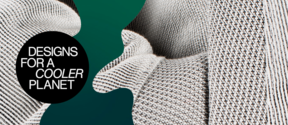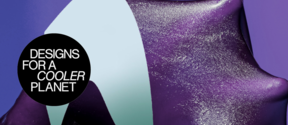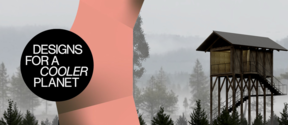Better to Wear | Virtual exhibition (external link)
We make fashion sustainable.

There's no time to waste: the climate crisis, biodiversity loss and the depleting stock and uneven distribution of critical resources threaten to make our everyday life unsafe. The UN and hundreds of countries have set a goal of limiting the increase of global warming to 1.5 degrees, but that goal is slipping out of reach because of insufficient climate action.
Together, we can make big changes. That requires imagination, a holistic mindset and new systemic solutions.
The theme for Designs for a Cooler Planet 2022 is Life 1.5. We want to present our community’s solutions and visions of a more meaningful life in the future. How do we support diversity, curb over-consumption, slow down global warming and build a better working life?
We are looking for inspiring research projects, prototypes, research-based companies and student work that we can showcase to the general public, stakeholders and our own Aalto community.
How does your work contribute to designing a better future? You can suggest an on-going research project or a ready-made solution, a research-based company, a conceptual experiment, an artistic work or an academic model of a process.
We're also open to suggestions for an exhibition, a seminar, a sightseeing tour or other event. The final projects will be selected in February 2022. The Designs For a Cooler Planet event will be held in Otaniemi in September 2022 for the fourth time.
The 2021 event was a success, engaging over 2,000 people. More than 260 people took part in the guided exhibition tours, and over 800 people from 29 countries participated in the virtual events. Approximately 1,500 students, faculty and staff members from Aalto came to see the live exhibition, which was covered by both domestic and international media (e.g. Dezeen, Kauppalehti and Tekniikka&Talous).
Want to know more what 1.5 degree lifestyle could mean? See the report from 2019 by Sitra.
Aalto staff and students can apply until January 17, 2022 (Note that the original deadline was on January, 10, 2022 but in the sake of holiday season we postponed it). Please download the registration form (log in to see it) and send it by email to [email protected].
You have an inspiring idea that can be turned into an exhibition, lecture or spectacular visual material. Our primary target audience is non-academic, and our goal is to communicate the research or project as widely as possible.
The proposed project may be something that's already finished or something that will be produced during the spring or summer. You can also suggest a project that was previously featured in Cooler Planet if there are new materials and results.
You are responsible for the implementation of the exhibit or event, the exhibit structures and the costs, but it is possible to get help implementing them.
We organize:
The exhibition aims to have a societal impact and increase visibility. We will invite a wide range of people to attend, including decision-makers, school pupils, international media, science foundations and business partners.
Designs for a Cooler Planet also introduces Aalto's work to our first-year students, and it is an excellent destination to visit during courses.
Building an exhibition is a good way to crystallise and concretise your own research topic for outsiders. Each year, there have been several research projects that haven't previously made an exhibition. We can recommend good design or visual design students that can help you.
The main venue for the exhibitions is Väre on the Otaniemi campus, but you can also suggest satellite exhibits. Events, such as seminars, workshops or open studios, can be either physical or online.
Cooler Planet event is longer than ever and will take place 7.9–12.10.2022.
Helsinki Design Week will take place 8–18 September 2022.
The event is organised in cooperation with Aalto Communication Services, Leadership Support Services, Advancement and Corporate Engagement (ADCO), Aalto Networking Platform, as well as the cross-cutting approaches radical creativity, sustainable solutions and an entrepreneurial mindset.
The event is also part of the official program of Helsinki Design Week and the New European Bauhaus.
More information:
Enni Äijälä, Specialist, exhibitions with partners and outreach
+358 50 359 4810
Helsinki Design Week is the largest design festival in the Nordic countries. Held annually in September, the festival presents new designers and multidisciplinary phenomena, promotes design internationally in collaboration with various organisations, and provides a platform for citizens to participate in the development and discussion of the city through design. Collaboration with Aalto University brings the academic voice and multidisciplinary way of doing to that discussion.
The new European Bauhaus is an initiative launched by the European Commission to develop new policies that reduce the carbon and material footprint of housing and construction and promote human and natural well-being. The aim is to create a new European way of life and attractive societies that work in harmony with nature, and to bring the European Green Deal into our living environments. Aalto University is a partner in the New European Bauhaus initiative.

We make fashion sustainable.

Fascinating biomaterial experiments.

More sustainable and liveable living environments.



